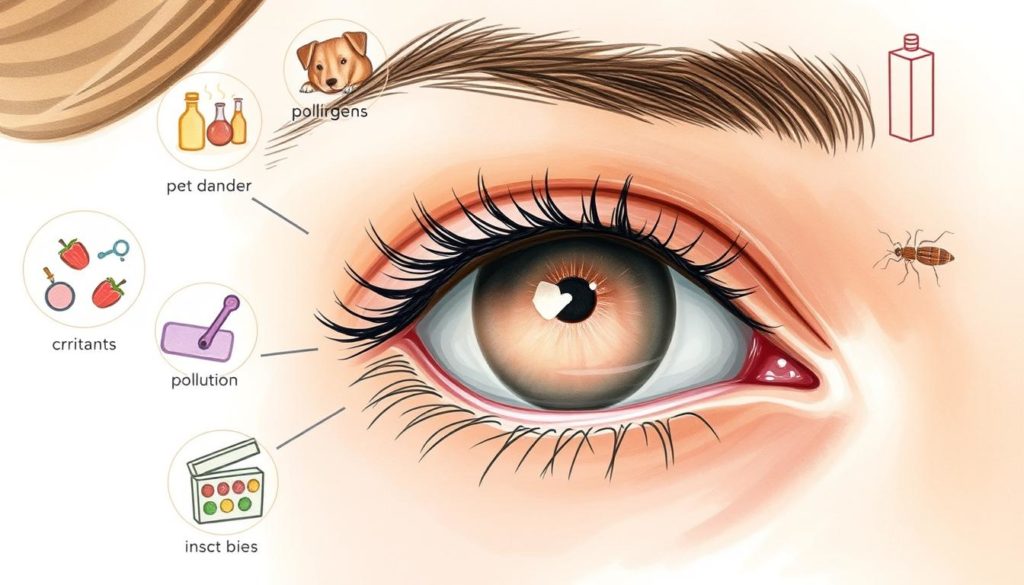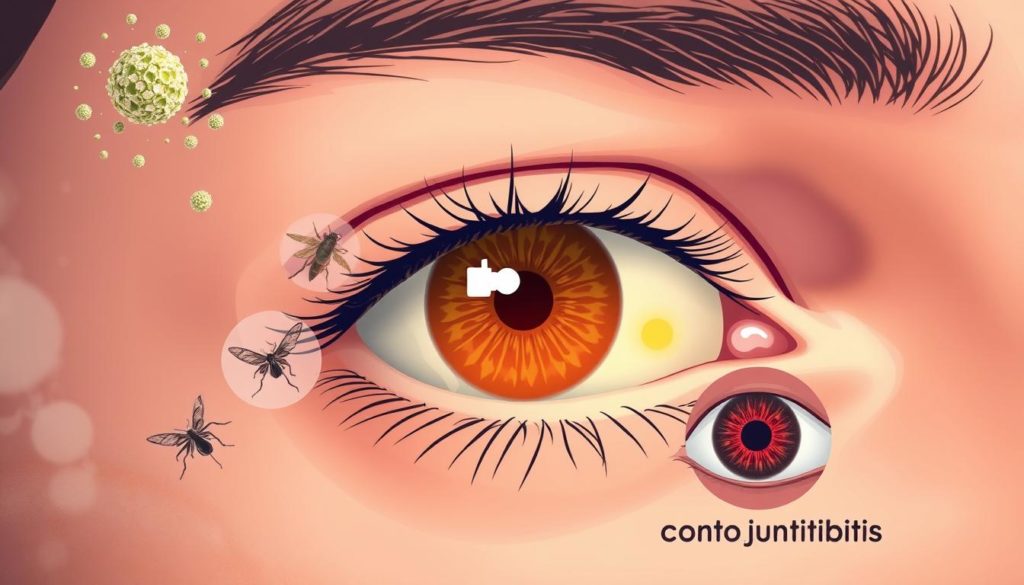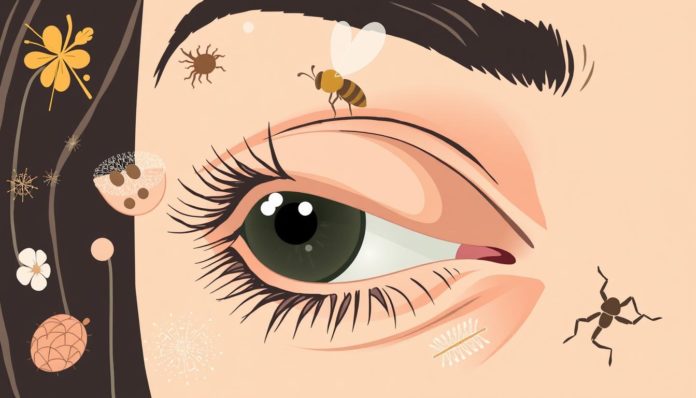Did you know more than 20% of people have swollen eyelids sometime in their life? This shows it’s a widespread issue, touching lives worldwide. But what triggers swollen eyelids and how can you tackle it?
Getting to know the reasons behind swollen eyelids is key for those dealing with it. It might be allergies, infections, or something in the environment. Spotting early signs is vital for easing the discomfort.
Swollen eyelids vary from slight puffiness to intense inflammation. The causes behind the swelling can affect your day-to-day life. Hence, figuring out what triggers it and finding ways to deal with it is critical for healthy eyes.
Let’s dive into what leads to swollen eyelids and uncover ways to soothe this frequent trouble.
By learning about swollen eyelid causes, you can act early to keep your eyes healthy and free from irritation.
Understanding Swollen Eyelids
Swollen eyelids can make one feel uncomfortable and look different. Such conditions can disturb your daily life and eye health. It comes from many causes, which show different symptoms and triggers. Knowing why eyelids swell and how it affects you is key.

What is a Swollen Eyelid?
When an eyelid gets swollen, you’ll notice its puffiness. This happens because fluid builds up in the tissue around the eye. It can be due to allergies, infections, getting hurt, or other environmental causes. Finding the root cause is vital for dealing with the swelling.
Symptoms to Watch For
If your eyelid swells, you might see some signs. These signs help us figure out what caused the swelling. Look for:
- Redness and warmth in the eyelid area
- Itchiness or discomfort that stays
- Visual problems like blurry vision or trouble seeing
- Discharge which could mean an infection
Spotting these symptoms is crucial. It helps find out the cause of swollen eyelids. This leads to the right treatment.
Common Swollen Eyelid Causes
Swollen eyelids can be quite bothersome and are often the result of various underlying factors. Identifying the specific triggers helps in addressing the condition effectively.
Allergic Reactions
Allergic reactions are frequent causes of puffy eyelids. Common allergens include pollen, dust, pet dander, and certain foods. These allergens can cause the body to release histamines, leading to inflammation and swelling around the eyes. Over-the-counter antihistamines often provide relief, but identifying and avoiding the allergen is key to preventing recurrence.
Infections
Another common culprit behind swollen eyelid triggers is infections. Both bacterial and viral infections can cause significant swelling. Conjunctivitis, commonly known as pink eye, is a widespread bacterial infection resulting in redness, itching, and swelling. Viral infections, such as herpes simplex, can also affect the eyelid, leading to inflammation and discomfort. Proper hygiene and timely medical treatment are crucial in managing these infections.
Injuries and Trauma
Injuries and trauma to the eye area are also notable causes of puffy eyelids. Blunt force impact, surgical procedures, or even an accidental scratch can lead to swelling and bruising. The body’s natural inflammatory response to injury often results in fluid accumulation and puffiness around the affected area. Cold compresses and anti-inflammatory medications can alleviate these symptoms, promoting faster recovery.

Understanding these common causes of swollen eyelids can help in better managing and preventing this uncomfortable condition. Proper diagnosis and treatment can ensure the swelling subsides quickly, restoring comfort and normalcy.
Allergic Reactions and Eyelid Swelling
Eyelid swelling often comes from allergic reactions. Knowing what triggers allergies helps prevent and manage eye discomfort. Here, we’ll explore common causes of puffy eyelids.
Common Allergens
Several things can cause allergies that make eyes swell, including:
- Pollen
- Pet dander
- Makeup
- Certain medications
These allergens can touch our eyes directly or float in the air, irritating our eyes.
How Allergies Affect the Eyes
When we bump into an allergen, our bodies fight back by releasing histamines. This leads to swelling, redness, and itching. It’s our body trying to protect us.
Staying away from the causes of swollen eyelids means figuring out what you’re allergic to. Watching closely and maybe getting tested can help avoid future problems.
Infections Leading to Swollen Eyelids
Many infections can make your eyelids swell. These can be bacterial, viral, or fungal. Each type has its own signs and needs a different treatment. It’s important to know these causes. This way, you can get the right help quickly and manage the problem well.
Bacterial Infections
Bacterial infections often cause swollen eyelids. Styes and conjunctivitis are usually to blame. A stye happens when an oil gland on your eyelid is blocked by bacteria. This leads to a painful, swollen spot. Bacterial conjunctivitis, meanwhile, causes redness, goopiness, and eye puffiness. Antibiotics typically work well for these issues.
Viral Infections
Swollen eyelids can also result from viral infections. Herpes simplex and varicella (shingles) are common examples. Herpes simplex might give you painful blisters on or near your eyelid. Shingles can make your eyelid inflamed and swollen. You’ll likely need antiviral meds and supportive care to get better from these.
Fungal Infections
Fungal infections are rarer but still cause swollen eyelids. They’re more likely if you have a weak immune system or after an eye injury. Your eyelids may get swollen, red, and itchy. Treating these infections early with antifungal meds is crucial to avoid more issues.
| Type of Infection | Common Symptoms | Treatment |
|---|---|---|
| Bacterial Infections | Redness, discharge, painful swelling | Antibiotics |
| Viral Infections | Blisters, inflammation, pain | Antivirals and supportive care |
| Fungal Infections | Itchiness, redness, swelling | Antifungal medications |
Environmental Factors and Puffy Eyelids
Sensitivity to different environmental factors can cause puffy eyelids. Knowing what causes this can help lessen the discomfort. Pollution and various climate conditions are mainly to blame.
Pollution
Pollution greatly affects eyelid swelling. Smog, chemicals, and other pollutants can make eyes inflamed and puffy. Cities, with more pollution, see more people with puffy eyes. It’s vital to protect your eyes from these harmful substances.
Climate Conditions
Weather can also cause eyelid swelling. Too much sun can make the skin around your eyes inflamed. Strong winds can dry out and irritate your eyes, causing puffiness. Both hot and cold extremes can make this worse. Taking care of your eyes in these conditions is key.
Injuries and Trauma Related to Swollen Eyes
Eye trauma can lead to swelling in your eyelids. This happens when your eye gets hit during sports, accidents, or other activities. The swelling is how your body reacts to the injury. Knowing how this swelling occurs and how to care for it is important.
- Blunt force impacts
- Surgical procedures
- Accidents involving foreign objects
After an eye injury, your body sends more blood to the area. This causes your eyelid to swell. It’s key to tell the difference between simple swelling and serious injuries. Serious stuff like bone fractures or internal bleeding need quick action. If you see changes in vision or feel a lot of pain, get medical help right away.
Initial treatment steps for eye trauma include:
- Applying a cold compress to reduce swelling
- Keeping the head elevated to minimize blood flow to the swollen area
- Avoiding pressure on the injured eye
Correct and quick care for swollen eyelids after injury is crucial. It helps avoid long-term issues and speeds up recovery. While minor injuries might need just first aid, always see a doctor for severe or lasting symptoms.
Contact Lenses and Eyelid Swelling
Contact lenses are a great substitute for glasses. However, not using them right and certain types can cause your eyelids to swell. This can include infections and irritation. It’s important to know why this happens to avoid and treat swollen eyelids from contacts.
Improper Use
Not using contact lenses the right way can lead to eye problems, like swollen eyelids. The main reasons for this include:
- Poor hygiene: Failing to clean your lenses can bring bacteria, leading to infections such as keratitis.
- Overuse: Keeping lenses in for too long, especially overnight, cuts off oxygen and annoys the eye.
- Incorrect fitting: Lenses that don’t fit well can rub against the eyelids, causing swelling and pain.
Types of Contact Lenses
The make and design of contact lenses affect the risk of eyelid swelling. Some are more likely to cause swelling than others:
- Soft lenses: They’re more comfy but can soak up pollutants and allergens, leading to puffy eyelids from contact lenses.
- Rigid gas permeable lenses: They let more oxygen to the eye but might irritate if they don’t fit right, causing discomfort.
- Daily disposables: These usually lower infection risk but can still cause swollen eyelids if not used correctly.
Cosmetic Products Leading to Puffy Eyelids
Many people find their eyelids swell because of makeup. We all like to use eye makeup to look better. But, some ingredients can irritate and cause allergic reactions. This leads to puffiness. Knowing what ingredients to avoid helps keep your eyes looking great.
Ingredients to Avoid
Certain ingredients in makeup can cause your eyelids to swell. Watch out for fragrances, preservatives like parabens, and oils like lanolin. These can cause allergic reactions for some. This results in swelling and itchiness. Knowing what’s in your eye makeup prevents irritation.
Safe Cosmetics Practices
For safe eye makeup use, do a patch test with new products first. Use gentle, hypoallergenic makeup removers for taking it off. It’s key to throw out old makeup. Using makeup made for sensitive eyes is also smart.
Keep your makeup tools clean to avoid infections. Wash your brushes and applicators often. Store them in a dry, clean place. This keeps them free from germs. By doing these, you can keep your beauty routine safe without swollen eyelids.
FAQ
What are common causes of swollen eyelids?
Many things can cause swollen eyelids. Allergic reactions, infections like conjunctivitis, and injuries are common causes. Even contact lenses used wrong, pollution, and certain cosmetics can make eyelids swell.
How do I know if my swollen eyelid is due to an allergy?
If your eyelids swell and you also have redness, itching, and watery eyes, it might be an allergy. Allergies can be triggered by pollen, pet hair, makeup, and some medicines.
What symptoms should I watch for with swollen eyelids?
Look out for redness, discomfort, itching, trouble seeing, and eye discharge. These signs can help figure out why your eyelids are swollen, like allergies or infections.
Can wearing contact lenses cause my eyelids to swell?
Yes, using contact lenses the wrong way can swell the eyelids. Poor hygiene, wearing them too much, or using ill-fitting lenses can cause this. It can also lead to infections like keratitis, which makes swelling worse.
What are the possible infections that cause swollen eyelids?
Swollen eyelids can be from infections like styes, conjunctivitis, herpes, and shingles. There are also rare fungal infections. Each one needs its own treatment.
How can environmental factors lead to swollen eyelids?
Things like pollution, smog, and chemicals can irritate your eyes and cause swelling. Wind, sun, and extreme temperatures can also puff up your eyelids.
What should I do if my eyelid is swollen due to an injury?
If an injury causes your eyelid to swell, use a cold compress to reduce it. It’s also wise to see a doctor to avoid serious damage and heal faster.
Are there specific ingredients in cosmetics that I should avoid to prevent swollen eyelids?
Indeed, avoid cosmetics with fragrances, preservatives, and certain oils that can irritate. Opt for products made for sensitive eyes and always test before full use.
How can I safely use cosmetics to avoid puffy eyelids?
For safe makeup use, always patch test and use proper removal methods. Keep an eye on product expiration dates. Clean your makeup tools and storage to avoid irritating and swelling your eyelids.


